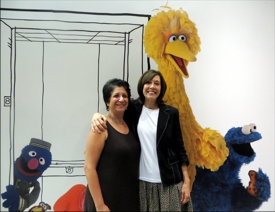|
J u d i t h
A n n e R i c e
My Sesame Street Adventure
|

Judith and Dr. Rosemarie Truglio,
Senior Vice President,
Content and Research at Sesame Workshop
|
June 15, 2016
Last year around this time, I received an unexpected phone call from Dr.
Rosemarie Truglio, Senior Vice President, Content and Research at Sesame
Workshop.
Dr. Truglio explained that Sesame Street was currently developing its 47th
season (to air during late 2016 or early 2017) and was focusing on
teaching kindness to preschool children. She had come across my activity
book published by Redleaf titled The Kindness Curriculum and invited me to
participate in a four person advisory panel that would meet at Sesame’s
New York headquarters for a daylong session in June. She told me that the
production team was looking for some ideas on practical ways to teach
kindness. Naturally, I informed her that I would get back to her with my
decision in a couple of months. Oh, did I just say “months?” I meant to
say I took a couple of seconds to agree to embark on my Sesame Street
adventure which was then scheduled for June 23, 2015.
After clearing security, I entered Sesame headquarters which was very
white and modern with punches of brilliant colors. The portraits of
favorite characters were showcased in guilded picture frames. When you
approached the picture it became animated and would speak. Several glass
display cases were overflowing with the many awards that Sesame has
received since it first started in 1969. My favorite spot was a break room
with a beautiful view of the city and a giant barrel light fixture covered
in large, bright yellow Big Bird feathers shining down on a round
conference table.
Everyone I met was warm, highly professional, and of course kind. The
three other panel members were Fretta Reitzes, Director of 92Y’s Goldman
Center for Youth & Family, Laura Pinger, Senior Outreach Specialist, and
Lisa Flook, Scientist, both from the Center for Investigating Healthy
Minds at the University of Wisconsin, Madison.
Each of us gave a 20 minute presentation about our work which was followed
by questions and answers. We discussed what it means to be a kind and
mindful preschooler today. Sesame looked to us for a better understanding
of current research and best teaching practices so that they could review
their show content and focus their efforts on curriculum goals for future
content development across media platforms.
After lunch, the Q&A continued with the staff asking questions like:
• What is an operational definition of kindness?
• How does mindfulness help build kindness? How are the two connected?
• What are the key components/competencies of kindness?
• How do we promote these social-emotional competencies?
• What are typical conflicts among preschoolers in and out of school?
• How are these conflicts solved in prosocial /peaceful ways?
It was very gratifying when a couple of people from the production staff
later approached me and said, “You will see some of your activities on the
47th season.” Everything that Sesame does is backed up by thorough
research, not just from one point of view but from many sources so it is
balanced. But here is the key: They wanted to know if the activity or
approach to learning actually works in a real preschool setting? That told
me that Sesame is committed to improving children’s lives through its
programming and not simply interested in building an audience and
entertaining young children.
This fall when I return to my job as an Early Childhood Family Education
Teacher for St. Paul Public Schools, my classes will focus on the topic of
kindness. We are planning a trip to a nursing home to engage the children,
their parents, and residents in activities designed to build an
appreciation for one another. Our field trip to Como Park in St. Paul will
encourage families to participate in what we call “Coins for Como,” making
a small donation as we enter the park’s zoo to practice generosity and
becoming part of the community.
Parent and child homework will include an assignment to commit random acts
of kindness and then share those experiences at school. Other assignments
will deal with creating calm, love, feelings and empathy, gentleness,
respect, self-control, friendship, conflict resolution, and more. Those
activities will be reinforced by repetition of concrete experiences in the
classroom. For example, when we have snacks and the child cleans up after
themselves, we say, “Thank you for being responsible.”
Later In the year, the child will proudly say, “I am responsible.” At that
point, they have internalized the lesson that cleaning up after themselves
is an example of being responsible! Sounds like a big word for a
preschooler, but they understand what “being responsible” means after
doing it many times and they then apply it to other positive behavior. We
will focus on one rule: Be kind.
I am excited that Sesame Street has dedicated this next season to Kindness
and hope that you, too, will join in, helping young children learn
kindness which is so critical to developing their full human potential.
Home
Judith Anne Rice
judith@judithannerice.com |